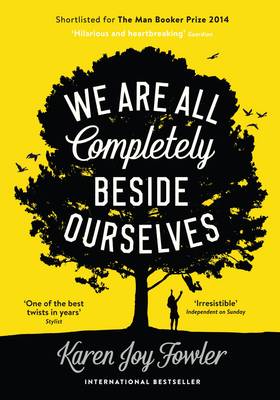Reviewed by girlinthepages on
The protagonist, Rosemary, has the self-proclaimed habit of telling stories starting in the middle, so when the novel beings she is attending UC Davis, though it is revealed later in the novel that the story has actually been narrated by an older adult Rosemary. Though I enjoyed reading about Rosemary’s quirky family, with her psychologist father and her eccentric relationships with both sides of her grandparents, it was a bit dizzying to read, as the narrative jumped from college to flashbacks of her childhood to mentions of the present. Fowler’s writing style was also a bit choppy, and by the end of the book I had become irritated with it.
It’s disclosed early on in the book (and on the back cover, so I don’t know why it’s not mentioned in the Goodreads Synopsis) that Rosemary grew up with a “twin” sister Fern, who is a chimpanzee, as her parents were participating in what were apparently rather popular studies in the 1970s of raising human children alongside chimpanzees in order to study growth, development, and behavior patterns and similarities. It was really interesting to learn about these studies, and often times heartbreaking, as the novel was honest about addressing the mistreatment that many animals suffer at the hands of science and research in order to make advancements for humans, especially in the field of immunology. I think that’s what kept me reading the book, even when the writing style or the characters had turned me off- the important awareness and exposure of the mistreatment of animals in research that is happening even at many universities. Rosemary’s relationship with Fern is heart wrenching and the end of the novel left me feeling conflicted, as I didn’t know whether to be relieved or upset at the trauma incurred during the duration of the novel.
What lessened by enjoyment of the book were the characters themselves. I couldn’t really find a single major or secondary character that I related to or that didn’t irritate me. The protagonist Rosemary narrates the entire book but is almost devoid of personality (this is probably somewhat due to the fact that she admits she has largely stopped talking openly with people after a scarring event during her childhood, but considering her inner monologue is narrating I expected a bit more liveliness) and the secondary characters (Harlow, her brother Lowell) seemed almost overbearing and annoying to compensate for Rosemary’s listlessness. There were a few what I suppose you could call “third tier” characters that I enjoyed (her overzealous apartment manager Ezra, her roommate Todd) that I enjoyed, but the reader barely gets any page time with them. Fowler also threw in a lot of scientific and psychological terms and references without a lot of explanation that went way over my head as someone with just a basic background in those fields, and it was annoying to feel as though I was missing out on things, and didn’t want to have to google them just for the sake of understanding one passage.
Favorite Quotes:
“…the lesson seemed to be that what you accomplish will never matter so much as where you fail.” (pg 25)
“But no one is easier to delude than a parent; they see only what they wish to see.” (pg 274)
Overall this book’s lower rating isn’t indicative that it was a bad read, rather that it just wasn’t aligned with many of my interests and I couldn’t really relate to it or find enjoyment in the characters. It’s an interesting story and definitely brings awareness to important issues regarding animal abuse and animal rights in a intriguing family narrative format, and I would recommend this novel to anyone interested in those fields as well as in psychology in a fiction-based format. Though I was turned off by the writing style of this novel, I’m still hoping to read The Jane Austen Book Club by the same author, which I’ve heard good things about.
Reading updates
- Started reading
- 8 May, 2014: Finished reading
- 8 May, 2014: Reviewed
